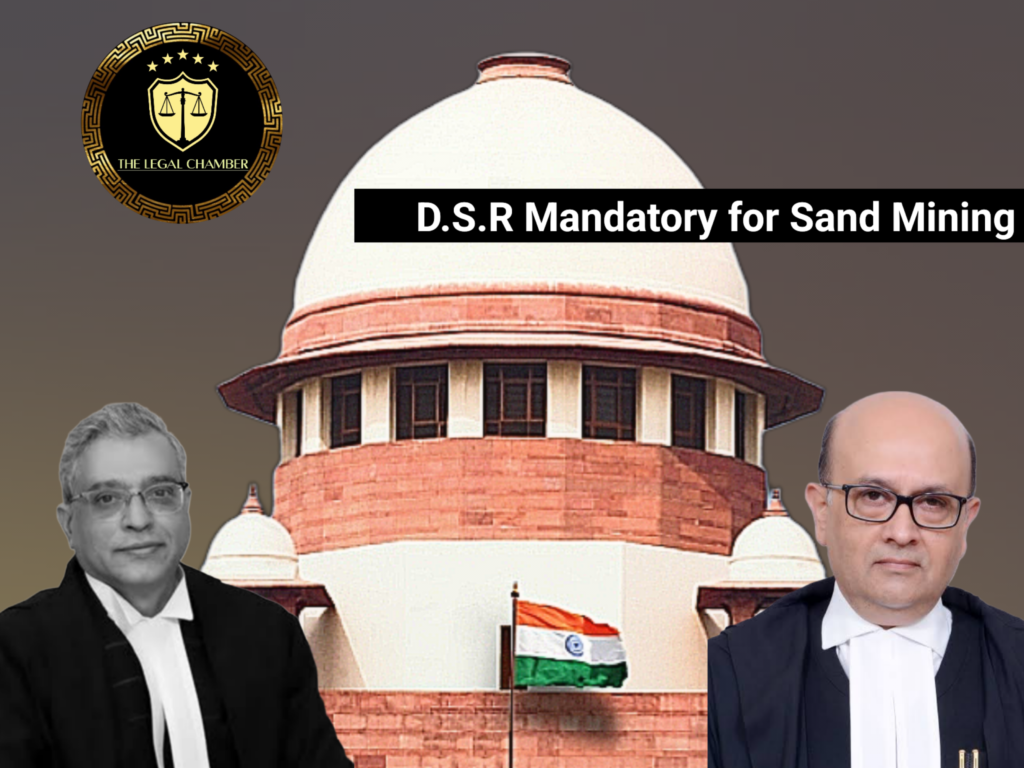
The Supreme Court upheld the National Green Tribunal’s quashing of a sand mining e-auction, ruling that only a final, valid District Survey Report (DSR) permits environmental clearance. It reinforced mandatory DSR compliance under EIA Notifications, stressing strict adherence to environmental regulatory frameworks and prohibiting reliance on draft DSRs.
Facts Of The Case:
The case arose when the District Magistrate of Saharanpur, Uttar Pradesh, issued an e-auction notice dated 13.02.2023 for sand, gravel, and boulder mining in the riverbeds under the U.P. Sub Mineral (Remedy) Rules, 2021. Gaurav Kumar, a resident of Haryana, challenged this notice before the National Green Tribunal (NGT), arguing that the auction was illegal as there was no valid District Survey Report (DSR) at the time. The last approved DSR for Saharanpur district, finalized in 2017, had expired in 2022, and only a draft DSR had been prepared by 13.01.2023. Despite the absence of a finalized DSR, Letters of Interest (LOIs) were issued to successful bidders.
The NGT, after constituting a Joint Committee and receiving its report, quashed the e-auction on the grounds of violation of EIA Notification, 2006, as amended, and the 2020 Enforcement and Monitoring Guidelines. The Tribunal held that environmental clearance granted on the basis of a draft DSR was unsustainable. The State of Uttar Pradesh and affected bidders appealed to the Supreme Court, which upheld the NGT’s decision. The appeals, including those by LOI holders, were dismissed, and the Supreme Court provided detailed reasoning affirming the legal necessity of a finalized DSR before conducting such auctions.
Procedural History:
The procedural history of the case began with the issuance of an e-auction notice dated 13.02.2023 by the District Magistrate, Saharanpur, inviting bids for sand mining without a finalized District Survey Report (DSR). Gaurav Kumar challenged this notice before the National Green Tribunal (NGT) under Sections 14 and 18 of the National Green Tribunal Act, 2010. The NGT constituted a Joint Committee comprising the Central Pollution Control Board (CPCB), Uttar Pradesh Pollution Control Board (UPPCB), and the District Magistrate to investigate the matter. The committee’s report confirmed that LOIs were issued based on a draft DSR.
Despite subsequent approval of the DSR by SEAC on 03.05.2024 and SEIAA on 24.05.2024, the NGT quashed the e-auction and LOIs, holding that the auction violated environmental regulations, particularly the EIA Notification 2006 and the Enforcement and Monitoring Guidelines for Sand Mining, 2020. Aggrieved by this decision, the State of Uttar Pradesh and LOI holders filed civil appeals before the Supreme Court. After considering submissions from all parties, the Supreme Court upheld the NGT’s order, dismissed the appeals, and delivered a reasoned judgment on 08.05.2025, emphasizing the mandatory nature of a valid, finalized DSR for granting environmental clearance.
Read Also: Supreme Court Upholds Quashing of 498A Case Against In-Laws : Calls It ‘Abuse of Process'”
Court Observation:
The Supreme Court observed that the District Survey Report (DSR) is a document of seminal importance, forming the legal foundation for environmental clearance in sand mining projects. It held that a draft DSR is legally untenable and cannot serve as a basis for granting such clearance. The Court emphasized that the DSR must be prepared in strict accordance with the procedure prescribed under Appendix X of the EIA Notification, 2006 (as amended), and must be valid and subsisting at the time of the auction and clearance process. It noted that the DSR must be placed in the public domain, subjected to public comments, and finalized within six months, with a mandatory validity period of five years.
The Court reiterated that the District Environment Impact Assessment Authority (DEIAA) and the District Expert Appraisal Committee (DEAC) have a statutory duty to ensure full compliance with these requirements. It also referenced previous judicial precedents, including Deepak Kumar v. State of Haryana and State of Bihar v. Pawan Kumar, to underscore the importance of environmental safeguards. The Court concluded that the e-auction based on a draft DSR was illegal, and upheld the National Green Tribunal’s decision quashing it.
Final Decision & Judgement:
The Supreme Court, in its final decision, dismissed all civil appeals filed by the State of Uttar Pradesh and the affected Letter of Interest (LOI) holders, thereby upholding the judgment of the National Green Tribunal (NGT). The Court held that the e-auction notice dated 13.02.2023 for sand mining was illegal and unsustainable in law as it was conducted without a valid and finalized District Survey Report (DSR), in violation of the mandatory requirements under the EIA Notification, 2006, and the Enforcement and Monitoring Guidelines for Sand Mining, 2020.
It reaffirmed that a draft DSR has no legal sanctity for granting environmental clearance and that only a valid, subsisting DSR, prepared in accordance with the prescribed legal framework, can be the basis for environmental assessment and project appraisal. The Court emphasized the statutory responsibilities of DEIAA and DEAC in ensuring compliance with environmental regulations and stressed the significance of environmental due diligence in sand mining activities. Concluding that the regulatory framework demands strict enforcement, the Court unequivocally affirmed the principle of sustainable development and the necessity of environmental protection, thereby confirming the NGT’s direction to annul the impugned e-auction and associated LOIs.
Case Details:
Case Title: State of Uttar Pradesh & Anr. v. Gaurav Kumar & Ors. Citation: 2025 INSC 650 Civil Appeal Nos.: 14170 of 2024, 14933 of 2024, and 14000 of 2024 Date of Judgment: 08 May 2025 Coram (Judges): Hon’ble Mr. Justice Pamidighantam Sri Narasimha and Hon’ble Mr. Justice Manoj Misra
Download The Judgement Here